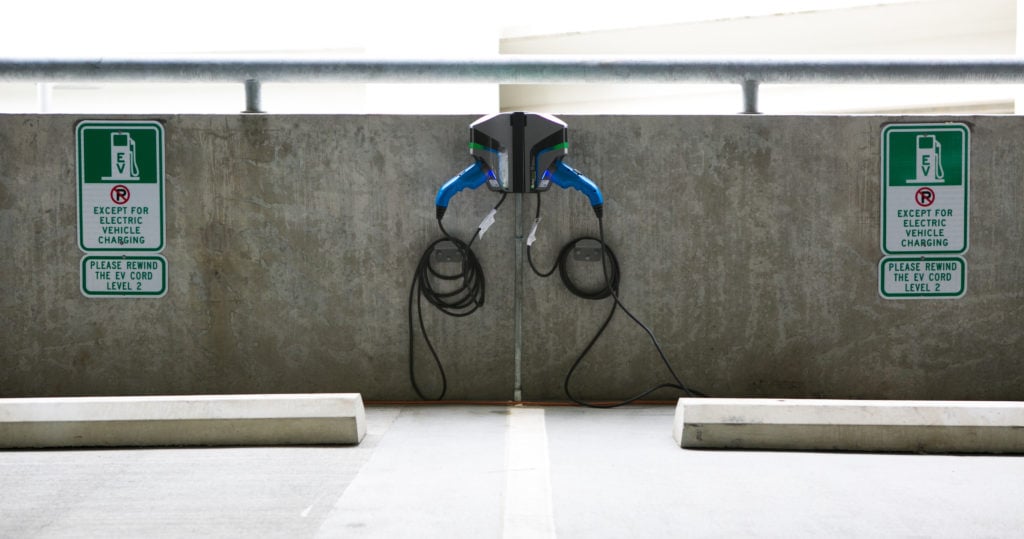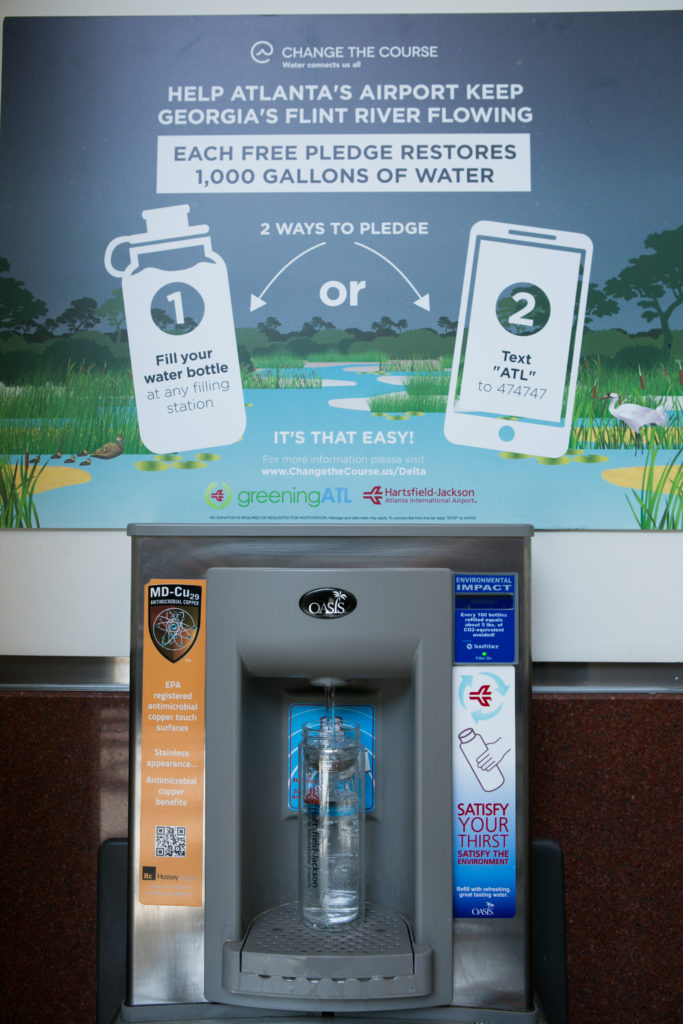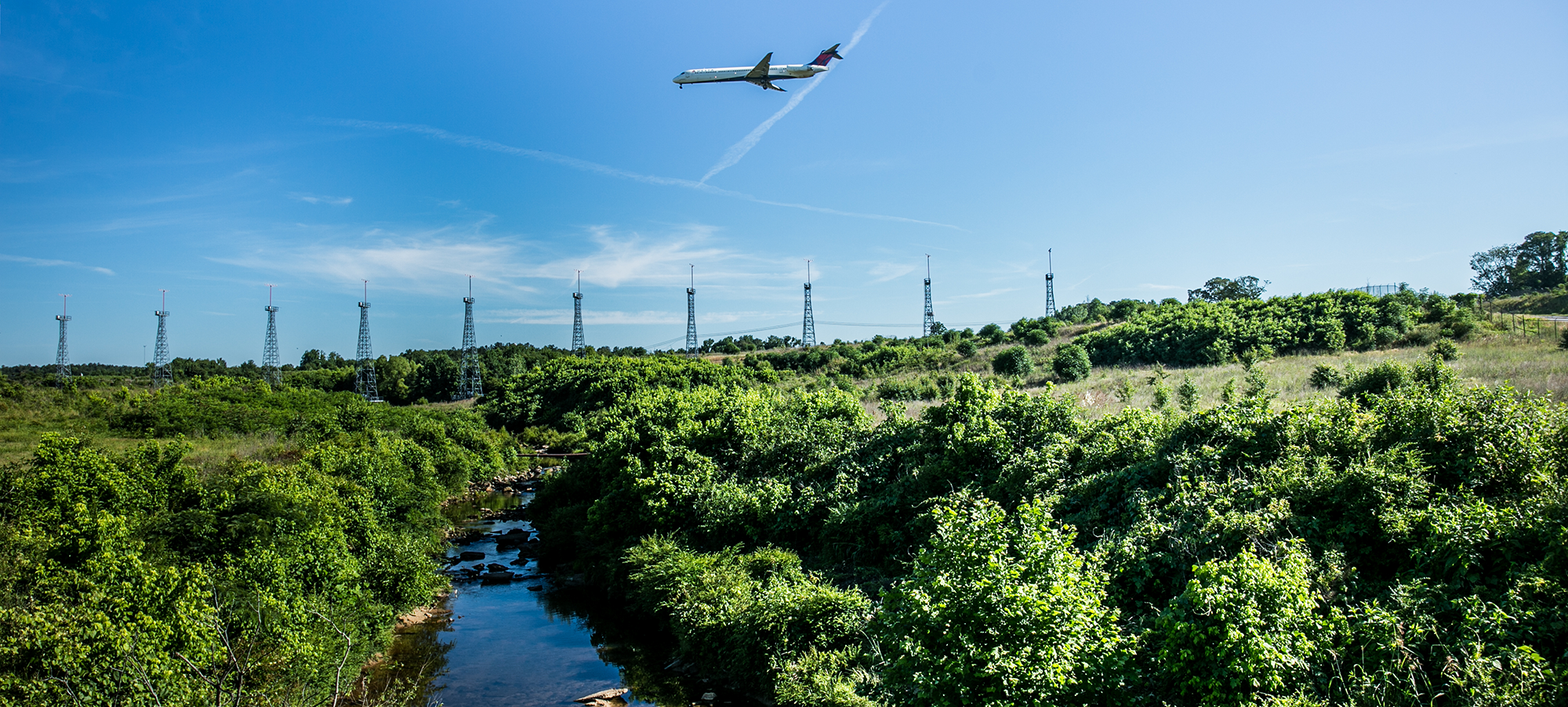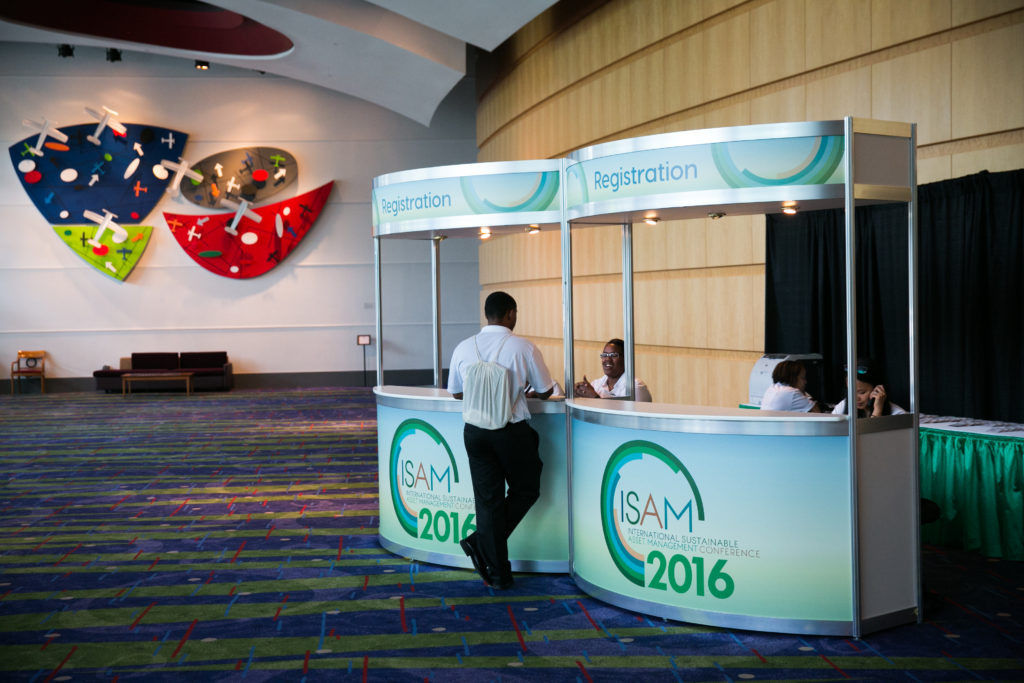


GreeningATL reflects our commitment to achieve the triple bottom line — people, planet and profits — while working to become the world’s “greenest” airport. Through innovation and cutting-edge technologies, Hartsfield-Jackson strategically incorporates a common-sense approach to manage our resources to ensure a sustainable future.
To that end, the Department of Aviation has pledged to plan, build, operate and maintain an integrative approach to achieve measurable results that propel our community, stakeholders and the environment. GreeningATL is where thinking “green” becomes routine.


POLICIES AND INITIATIVES
The City of Atlanta Department of Aviation is proud to present its second Environmental, Social, Governance + Prosperity (ESG+P) Report for calendar year 2022. As the world’s busiest and most efficient airport, Hartsfield-Jackson Atlanta International Airport has the responsibility to prioritize environmental stewardship and social issues within its operations.
Hartsfield-Jackson Atlanta International Airport is the world’s busiest airport. With this volume, ATL estimates that it typically generates 13,000 tons of waste each year. Understanding that the placement of materials in landfills damages the environment, depletes natural resources, and transfers liabilities to future generations, ATL established guidelines for increased sustainability. The goal of the Zero Waste Policy is to divert 90 percent of the total waste generated at ATL from local landfills by 2035.
As we aspire to achieve zero waste by 2035, ATL must address contamination in the waste stream and increase the amount of recyclable and compostable materials used by passengers and procured by internal and external stakeholders. Concessions contracts include the following provision: “Non-compostable single-use serviceware, including plastic bags, plastic straws, and polystyrene items are prohibited.” This provision is referred to as the Sustainable Food Court Initiative (SFCI). This work is further supported by the City of Atlanta’s Plastic Ordinance that requires all City of Atlanta buildings reduce the use of single-use plastic. Learn more
Hartsfield-Jackson Atlanta International Airport (ATL) will adopt and implement an environmentally responsible procurement policy for:
-
Vehicle fleets
-
Energy-efficient electronic equipment such as computers, copiers, and printers
-
Paper and paper products
The procuring of environmentally preferable products and services were governmental, or other widely recognized authorities have established criteria. The policy will raise staff awareness on the environmental issues affecting procurement through educational programs and campaigns, which encourages suppliers and contractors to offer environmentally preferable products and services at competitive prices.
Hartsfield-Jackson Atlanta International Airport’s (ATL) Climate Action Policy will establish the direction for the entire organization through the adoption of practices and procedures that will reduce its greenhouse gas footprint. The Department of Aviation established 47 strategies that, once implemented, will result in a 20 percent reduction in greenhouse gas emissions.
While aircraft are the most significant sources of greenhouse gas emissions for ATL — contributing 80 percent of total emissions — our focus has been to reduce the emissions associated with non-aircraft related activities and sources. In 2014, our Scope 1 and Scope 2 emissions totaled approximately 190,000 metric tons of carbon dioxide equivalent emissions (mtCO2e).
The City of Atlanta’s minimum requirement of LEED Silver certification for all new construction was passed in 2003. This standard includes the new construction of buildings, roadways and runways. This policy also establishes LEED standards for our existing buildings and renovations. It also applies the term “deconstruction” to plans versus “demolition” to ensure deconstructed material is reused where possible.
ATL has made great strides in reducing our energy demand through a number of strategies including the development of our first Carbon Policy. The Airport will continue to prioritize the rapid reduction of our Scope 1 and 2 emissions. We are committed to the City of Atlanta 2019 Resolution No. 10-R-3783 to transition to 100% Clean and Renewable Energy by 2035 as well as the ACI 2050 Net-Zero goal. Learn more here.

RESILIENCE AND SUSTAINABILITY PROGRAMS
As part of EPA’s Food Recovery Challenge (FRC), ATL has pledged to improve sustainable food management practices and report the results. The FRC is part of EPA’s Sustainable Materials Management Program, which seeks to reduce the environmental impact of materials through their entire life cycle. This effort includes material extraction, manufacturing, distribution, use, reuse, recycling and disposal. The Department of Aviation is the first major institutional endorser of the EPA’s Food Recovery Challenge.
Current Impact:
Recovering 30,000 pounds of edible food and delivering to local communities daily.
Serving:
-
-
Action ministries for women and senior citizens
-
Veterans empowerment organizations
-
Veterans giveaway centers
-
Homeless citizens
-
ATL’s participation in the Good Traveler Program supports the development and implementation of a local carbon fund. The program is designed to promote passenger participation by providing an opportunity to voluntarily offset carbon emissions associated with air travel, while adding revenue to the Hartsfield-Jackson’s Sustainable Resource Fund emission reduction projects.
Hartsfield-Jackson Atlanta International Airport is the first domestic airport to purchase carbon offset credits to mitigate emissions from sources under the control of the airport. A carbon offset is a greenhouse gas reduction that is used to counterbalance or offset GHG emissions. One carbon offset represents the reduction of one metric ton of carbon dioxide or its equivalent in other greenhouse gases.
AERO is a transportation management association that provides services to reduce employee commuting in single-occupancy vehicles for the Department of Aviation, airlines, concessionaires and all other companies working within the boundary of the ATL EcoDistrict. AERO assists employees in identifying carpooling opportunities and transit routes. The large and diverse Airport employer population will allow AERO to maintain and form partnerships with key employers and stakeholders resulting in metric-based transportation demand management programs.

Hartsfield-Jackson Atlanta International Airport (ATL) continues to expand the alternative fuel infrastructure on the Airport campus. The project includes the installation of 300 electric chargers for both passengers and employees. The project also encourages airlines and other Airport tenants to convert its commercial vehicle fleet to electric from gas and diesel.
Smart Energy Decisions: Innovation Awards 2018

The Atlanta Better Buildings Challenge was launched in June 2011 at the Clinton Global Initiative as one of the inaugural projects of the Dept. of Energy’s Better Buildings Challenge program. Initially, Atlanta competed among six other cities in the challenge: Los Angeles, Seattle, Denver, Washington D.C., Sacramento and Houston. The goal is to reduce energy and water consumption by at least 20 percent in participating buildings across Atlanta by 2020. Atlanta currently leads the nation in the amount of square footage committed to the program, at just over 111 million square feet, representing more than 590 participating buildings.
Awards and Recognition
The Flint River, one of the country’s longest free-flowing rivers, starts just north of Hartsfield-Jackson Atlanta International Airport. Starting as a small spring in East Point, it flows directly underneath the Airport and then joins the Chattahoochee River and flows into the Gulf Coast’s Apalachicola Bay. The Flint River runs 349 miles with nearly 220 river miles flowing unimpeded. Cities, farmers and industries all depend upon water flowing in the Flint River.
Finding the Flint is a partnership of organizations initiated by the Atlanta Regional Commission, American Rivers and the Conservation Fund to raise awareness about the Flint River. ATL participates with Finding the Flint and is identifying opportunities to manage its stormwater to directly benefit the river.

Change the Course Program is a Delta Air Lines and City of Atlanta Department of Aviation partnership in conjunction with the Bonneville Environmental Foundation. This program is both an educational and a water restoration program. When a passenger or employee refills their water bottles at select water bottle refilling stations or sends a text message ATL to 474747 certifying commitment to conserving water in their own home, 1,000 gallons of water is restored in the Flint River. Change the Course brings together the public, corporations and on-the-ground conservation organizations to raise awareness about freshwater, reduce water footprints, and restore flows and health to vital freshwater ecosystems.
Hartsfield-Jackson Atlanta International Airport’s Commercial Vehicle Hold Lot was the first completed facility under the ATLNext, the Airport’s multibillion-dollar capital improvement program, and the first City-owned building to house a solar production facility. This solar array is expected to generate about 100,000-kilowatt hours of electricity annually, which will be used to help power the new CV Hold Lot facility. Given this and other features, the facility is on track to achieve LEED Gold certification, furthering the City’s and Hartsfield-Jackson’s commitment to resource conservation and operational savings. Learn more.

In support of the Technology Campus architectural and engineering research, development, and demonstration efforts, this project would explore the installation of a prototyped energy recovery ventilation panels called “AirFlow Panels” at POD D – Tech Campus. These panels reduce air conditioning energy use by 25-50 percent while creating a healthier indoor environment and improving ventilation control in buildings.

INDUSTRY AND COMMUNITY ENGAGEMENT
The Hartsfield-Jackson Atlanta International Airport actively participates in the Airports Going Green Conference and is the esteemed host airport of the 2018 conference. Hosting the 2018 Conference in Atlanta increases ATL employee conference participation, garners an opportunity to showcase area sustainability initiatives, and expands broad regional interest through increased engagement. Learn more.
The International Sustainable Asset Management Conference (ISAM) will serve as a platform to exhibit best practices, introduce new standards, showcase new technology, offer training and development, as well as create networks within the Sustainability and Asset Management communities. Hosting a conference of this magnitude provides a venue for evaluating case studies, best practices, effective policies and advocacy.

ATL EcoDistrict is a collaborative relationship between the Department of Aviation and the businesses and organizations that conduct business on the 4,700 acres called Hartsfield-Jackson Atlanta International Airport. The EcoDistrict has three primary focus areas or imperatives — Resiliency, Equity and Climate Protection — accomplished through several priorities established by EcoDistricts®: Place, Prosperity, Health and Wellbeing, Connectivity, Living Infrastructure and Resource Regeneration. Since the 2013 inception of ATL EcoDistrict, this effort is to certify ATL EcoDistrict with EcoDistricts® in support of making ATL the greenest airport in the world. Learn more.
This program initiation emerged as a result of a Memorandum of Understanding between the City of Atlanta and Hubstart Paris Region Alliance in 2016. The City of Atlanta Department of Aviation has participated in six Sustainable Airport Area International Seminars. Each year, there is a different topic to promote sustainability and economic development. Airports from around the country and the world participate in the two-day event; the work continues throughout the year to support the program and promote economic development.
The City of Atlanta is committed to becoming a leading city in sustainability. Hartsfield-Jackson Atlanta International Airport is a vital player in achieving this goal, and therefore the continuous effort the Airport makes to incorporate sustainability into daily Airport operations is crucial. As the world’s busiest airport, Hartsfield-Jackson Atlanta International Airport is proud to host the annual GreeningATL Excellence Awards. The GreeningATL Excellence Awards luncheon will showcase ATL’s appreciation for the organizations, businesses and individuals who are working to make a positive impact on the environment, community and economy. Learn more.



